Displaying items by tag: Peter Malone's Movie Reviews
Beetlejuice, Beetlejuice
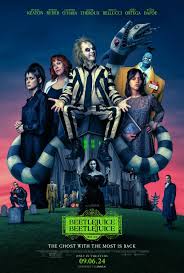
BEETLEJUICE, BEETLEJUICE
US, 2024, 105 minutes, Colour.
Michael Keaton, Winona Ryder, Catherine O'Hara, Jenna Ortega, Justin Theroux, Willem Dafoe, Monica Bellucci, Arthur Conti, Nick Kellington, Santiago Cabrera, Burn Gorman, Danny DeVito.
Directed by Tim Burton.
In Beetlejuice folklore, you have to call out Beetlejuice’s name three times and he will appear. But, this time it needed only just one repetition. And here he is, 36 years after his first appearance, ready to entertain old fans and new fans.
Perhaps it is something about the world situation in 2024 that the highest moneymaking films so far have been quite a contrast, the violent fantasy of Deadpool and Wolverine and the wonderful exploration of human motor emotions in Inside Out 2. Now Beetlejuice, Beetlejuice has made over $100 million at the American box office on its first weekend. So, we can ask, is our world with all the wars, deaths in war, cost of living crises, in need of a fantasy distraction, an indulgence in absurd comedy.
Because, that is what we have here, absurd characters in over the top absurd situations, lots of jokes, special ghostly effects, Beetlejuice’s wisecracks, all kinds of unexpected dramatic turns. There is a surface world with strange human characters, Winona Ryder again as Lydia now a TV host on ghost appearances, her mother, Catherine O’Hara again as Delia, an eccentrically loud artist – but Astrid, Lydia’s daughter, Jenna Ortega, has grown up sceptical of the whole Beetlejuice ghostly world. Her scepticism is about to come crashing down. And director, Tim Burton, going back to his old fantasy styles.
In the meantime, there in the Afterlife, Michael Keaton is Beetlejuice, always sly, raucously comic, with a host of office secretaries, all skeletal bureaucrats, especially the hapless Bob, suited, but in for some tormented times because a callous janitor in the Afterlife, played by Danny DeVito, vacuuming and polishing, the machine in water, electric shock and opening up the store of dead severed human parts – especially, of Beetlejuice’s former wife, played exotically by Monica Bellucci who will pursue him relentlessly.
Fans of the original will be happy to get back into the Afterlife, the madcap visuals, the special effects, the eerie creatures… And there is plenty of plot, Astrid tricked into helping a ghost to regain his life, Lydia to the rescue and agreeing to marry Beetlejuice, his wife in pursuit, Delia ending up in the Afterlife, and, to cap it all, Willem Dafoe, seeming to appear in every other film these days, as a skeletal actor who is in charge of investigations, preening himself in his performance, modelled on television shows, of how the police ought to act!
And, right at the end, there is a very long wedding sequence, all kinds of mayhem with a performance of McArthur Park, everybody singing along…
Beetlejuice may not appeal to every audience, especially those who don’t have a high tolerance for dark fantasy. But, he will probably appeal, in his own very distinctive Michael Keaton way, to most everyone else!
Rebel Ridge
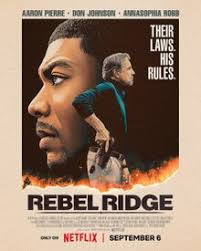
REBEL RIDGE
US, 2024, 131 minutes, Colour.
Aaron Pierre, Don Johnson, AnnaSophia Robb, David Denman, Emory Cohen, Steve Zissis, Zsane the, James Cromwell.
Directed by Jeremy Saulnier.
We are in Louisiana, definitely the atmosphere of the South, arrogant cops, political corruption, the treatment of an itinerant black man.
This is the kind of action film where the audience is invited to sympathise with the central character, in this case, Terry Richmond, played by British actor Aaron Pierre. He is riding his bicycle along Louisiana Road, bumped to the ground by pursuing police, treated as a suspect, all kinds of charges, no belief in his defence that he is carrying $30,000 to get to the court to place bail for one of his cousin. He is treated with contempt as well as disbelief, brutally treated, and his seeming to accept something of his fate.
Then we are introduced to the chief of police, played by Don Johnson, and audience hostility goes up several degrees. We see the corruption, get information that there have been many victims like Terry Richmond, and information that budgets are tight and the local police need this kind of forfeiting of money in such situations.
There is also a sympathetic young woman, Summer (AnnaSophia Robb) who is able to give Terry some documentation about the history of corruption.
By this stage, we are halfway through the film. Which means, of course, that Terry Richmond will come into his own, self-assertion, collaboration with Summer even as the police turn on her. The assistant at the police station does a bit of googling and, just a bit too late, finds out just who Terry Richmond is and what are his military qualifications.
While we might say that this action scenario is somewhat formulaic, that does not undermine the effect of audience identification with the central characters and the injustices, loathing of the corrupt police, the various stages of their comeuppance
As expected, the action becomes violent at times, and disgust at the lengths the police will go to justify themselves and eliminate opposition.
- The title? Louisiana? Attitudes of the American South? Race issues? Policing? Corruption?
- The Louisiana settings, the countryside, the towns, homes, police offices? The musical score?
- Terry Richmond, riding his bike, the pursuit by the police, stopped, apprehension, suspicions? His explanation, bail for his cousin? African-American?
- This kind of drama eliciting audience sympathy for the persecuted central character, the second half and the comeuppance of the persecutors?
- Terry, character, working in the restaurant, the Chinese background, phoning, raising the money, the restaurant attacked by thugs, his cousin and drug deals, wanting to post the bail? Arriving in the town, the interrogation by the police, in the cell? The encounter with the chief? The two arresting officers and their attitudes and behaviour?
- The financial situation of the police, the chief and his plan, the offices, the female officer in the office, her googling, finding out the truth about Terry? Taking of the money, the legal holding of the money, the use of the money, the cabinet full of weapons? Financial deals, the legal implications? The role of the judge – and the later interrogation, his killing himself?
- Summer, her background, drugs, rehabilitation, the judge, getting the job, her child? Talking with Terry, giving information, the meetings, the leads, the indication of an inside informer, presumption that it was the woman, the later revelation of Marston?
- Terry, the confrontation with the chief, verbal, physical? His military training, his skills? The exercise?
- The move towards resolution, the transfer of the prisoners, his riding by pursuing the bus, reassuring his cousin? The later news of his death?
- The complexities of the set-ups, his allowing himself to be taken, the drugging of Summer, the threats? Driving away, the ambushes, the shootouts, Rebel Ridge? Confrontation with the chief? Marston revealed?
- A picture of small town corruption, violent consequences, exposing the corruption, resolution?
12 Mighty Orphans
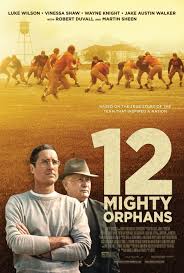
12 MIGHTY ORPHANS
US, 2021, 118 minutes, Colour.
Luke Wilson, Martin Sheen, Wayne Knight, Vanessa Shaw, Jake Austin Walker, Scott haze, Jacob Lofland, Robert Duvall, treat Williams, Larry Pyne.
Directed by Ty Roberts.
This is a film very much in the traditional American spirit, of country and patriotism, love of sport, especially football, appreciation of the underdogs.
It is based on a true story – however, quite a number of the facts and timelines have been altered for the drama.
In the aftermath of World War I (with a number of flashbacks of war action for the central character, Rusty Russell wounded, especially in his eyes but recovering), the film focuses on the Depression and its effect during the 1930s. In particular, it focuses on institutions for orphans, often looked down on in American society as second-class citizens.
Rusty Russell, already a top football coach, takes on the job at the Masonic institution for orphans in Fort Worth, Texas, travelling with his wife and family, his wife a successful English literature teacher. They are played by Luke Wilson and Vinessa Shaw.
The film shows the harsh life of the Institute, especially with one of the staff played by Wayne Knight, in charge of the printing business, exploiting the orphans, physical brutality towards them, and later revealed as embezzling money and colluding with the coach of an opposing team, a vengeful attitude towards Russell.
However, the focus of the film is on the orphans themselves, age 17, rough and ready, one with a particular chip on his shoulder and anger, gradually the group moulding into a team, getting gear from charities, working together with the coach who is inventive in his creation of play, becoming successful, opposed by powers that be with petty regulations and interpretation, the media intervening as well as to and ultimate success. However, with a sober realism, they lose the final championship match.
A number of veteran actors in supporting roles including Martin Sheen, at age 80, as the doctor assistant coach, a glimpse of Robert Duvall at age 90, and Treat Williams and Larry Pine as Roosevelt.
There is a fine tribute to the Russell’s as well as to each of the mighty orphans in the final credits, photos and an admirable list of achievements by each of them.
- Based on a true story? The alteration of facts and timelines? A tribute to Rusty Russell? His wife? Their work with the orphans, football and tactics, love of literature? The final tribute with the details of what happened to Russell and his wife, the 12 orphans themselves, achievement?
- A film of the American spirit, American football, sport, fans, even President Roosevelt, the Depression, the 1930s, poverty, lack of opportunity, the low status of orphans?
- The use of black-and-white photography, for World War I sequences, for the depression, the insertions? The atmosphere of the 1930s, Texas, the family travelling by car, the depressed communities, going to Fort Worth, the Masonic institution? The task of coaching the orphans? Of teaching them? The musical score?
- Russell and his story, the flashbacks to his experience in the trenches, the death of his brother, his blinding, his recovery? The recurring memories? His using his experiences to encourage the orphans? Married to Juanita, giving up a significant post, wanting to help the orphans? His daughters? His appearance and manner, glasses, difficulties with his eyesight? His explanation of his own background as an orphan?
- The Institute, the head, his concern about maintaining the workings, Frank Wynn, the printing, his bullying, hitting the students, his sneering attitudes, the rules, embezzling the money, his link with the rival coach, providing the birth certificate, his mistake, the confrontation with Russell, the hearings, his arrest?
- The orphans, their age, status, back stories, the mother abandoning Wheatie, Hardy, the death of his father, covered in blood, his resentments and anger? The lack of education? Interactions amongst themselves?
- The football theme: the opening, dressing room, the clashes amongst themselves? The rest of the story going back to arrive at this match?
- The boys themselves, their personalities, interactions? Hardy and his resentments, blood, shower, Snoggs trying to help? Continued manifestations of anger? The football field, rough, no shoes? The gradual building up of gear, shoes, pads, jerseys? Football issues? Scenes of training, boys’ reactions? Angers amongst themselves?
- The range of football matches, football scenes, the tactics, Russell’s daughter and her idea, the creative play, Russell changing play styles? The tough matches, the opponents, the referees?
- Doc Hall, age, no salary, his drinking, seeing the boys, a father figure, treating Hardy? Supporting Russell, recommending him? Assistant at the training, intervening in the crises, confronting authorities? At the games? His having to give up the drink?
- Juanita, supportive of her husband? The rough housing, settling in, her classes, enthusiasm, the boys and their learning?
- The rivalries, the hearings, Roy Kidd and the writing of the manual, his wanting to exclude the Mites, Doc Hall and the text? The hearings for their expulsion, his brother-in-law as the smug coach? The intervention of Amon Carter, his newspapers, watching the matches, his bets, links with the journalist, the reporting? The intervention of Roosevelt and the reversal of the decision?
- The hostile coach, setting up the big player to eliminate rivals? The hospitalisation of Fairbanks? Hardy, playing, his success, tactics? Eventually supporting the war cry?
- The failure to win, Hardy blaming himself, yet public support, fans, letters, demonstrations?
- The spirit of the Mites, the coach, love for football?
- The impressive tribute to the end and the careers of Russell and his wife and the orphans themselves, achievements?
Last Rifleman, The
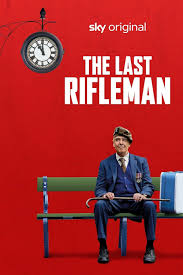
THE LAST RIFLEMAN
Ireland/UK, 2023, 95 minutes, Colour.
Perce Brosnan, Clemence Poesy, John Amos, Jurgen Prochnow, Ian McIlhinney, Samuel Bottomley.
Directed by Terry Loane.
This is a film which will entertain and inspire older audiences. It is an Irish-English production, focusing on an Irish character, a rifleman in World War II, and D-Day, some sequences of the fighting, the confrontation with the Germans, fear and heroism. While his friends have died, at the opening of the film, he is, as he states, 92 ¾. He is in an aged care home, with his wife of 68 years who has dementia, who dies.
Audiences who have seen Michael Caine and Glenda Jackson in the story based on the same characters and events, The Great Escaper, will note the similarities. But, of course, there are differences, English and Irish settings, various difficulties on travelling to the D-Day celebrations, the encounters along the way, the role of the media, the acclaim for both The Great Escaper and The Last Rifleman.
A great interest is the presence and performance by Pierce Brosnan, acting more than 20 years older than he is in real life, effective make up, a dignified personality, loyalty to his wife, loyalty to the memories of his friend, deciding to go to the D-Day celebrations for the first time returning.
The film is entertaining in the various steps for his travels, train, cab, bus, hitchhiking in the truck, the ferry to Normandy. And, encounters along the way, an earnest young man with a love of the music of Ennio Morricone and a pleasant anecdote and themes from The Mission, a fussy lady with her medications on a train, a very cheerful woman truck driver, a helpful cab driver, and a French woman (Clemence Poesy) and her two children who are able to smuggle him across the channel.
There is also an encounter with a German soldier, Jurgen Prochnow, and some mutual reflections, an encounter with an African-American soldier played by John Amos.
This is a quietly were reflective film about war and its consequences, on relationships, love and sadness, the dignity of older age and coming to terms with the past.
- Based on a memoir? (Comparisons with The Great Escaper?) Memories of D-Day, memories of war action, injuries and death? Living with the memories into old age? A story for the 21st-century audience?
- The Irish setting, the home for aged care, the rooms, dining room, offices? Travel in Ireland, cabs, buses, trains? The ferry to Cherbourg? The helicopter at the end? The French settings, the town, Normandy?
- Artie Crawford and his story? The flashbacks, the friendship with Charlie and Maggie, the photos, the beach? The scenes of action, confronting the Germans, the British and the Irish, the casualties? Artie and his fear, behind the tree? Charlie and his concern, helping Artie, going ahead, Charlie’s death?
- Artie, 92 ¾, in the home, waking, his room, going to Maggie, the 68 years of marriage, her dementia, feeding her the ice cream, her saying Charlie? His tenderness, the kiss, sitting in the room, the quietness of her death?
- Artie, the letters and photos, writing the letter to Charlie? Inviting Charlie to the 75th commemoration? The reality of Charlie’s death, Artie marrying Maggie?
- At the home, the discussions with Tom, the D-Day 75 years celebrations, Tom and reading the paper, phoning the journalist, the confrontations with the authorities at the home?
- Artie, the decision to go, packing, his health and medication, his age, sitting outside, the laundry van, escaping in the back of the van, £20 to the driver for directions, going to the station, the free travel for those aged, in the train, the lady with her medication, chatter, helping him? The delay in getting to the ferry? The assault by the young men? The help by the cab driver, the ride and the talk, the cabby’s tribute, no fee? In the bus, the young man, helping Artie to his seat with the case, the discussion, Morricone, the reminiscence that Artie met him in Verona with his wife, shook his hand, the playing of the theme from The Mission and Artie listening, the breakdown of the bus, Artie starting to walk, the young man with him, thumbing a lift, the French family refusing, the truck driver, the woman, the talk, Artie and his turn, diabetes, Coca-Cola and the sugar?
- The problems at the ferry, his outdated passport, the authorities? Juliette and her family, the family holiday, her health? Returning home, the van? Hiding in the van, on board, giving him the room, his turn, the nurse and the doctors, plan to get him out, the van driver, Juliette picking him up, the friendship with the children, discussions about the ice cream, the seeing him on television and the boy excited? The farewell and his thanks?
- The bus with the German soldiers, his attitude, some bitter memories, the conversation with the soldier, the reminiscences, gradual mellowing, singing A Long Way to Tipperary, the German and his young days, losing the war, discovering he was on the wrong side, the reconciliation, the German waving to the British troops and their waving back?
- Artie, the tourism office, going to the restaurant, encountering the American and his granddaughter, the conversations and reminiscences, the medals, the death of the American’s brother landing on D-Day, mutual respect?
- The journalist, given the story by Tom, flying to Paris, getting to Normandy, the tourist office, finding Artie, explaining the situation?
- The ceremonies, Artie having to face the truth that he was the last of the riflemen, going to the cemetery, Charlie’s grave, the memories, the media, the helicopter ride, Charlie and the acclamation?
- The sadness of the story, the nobility of the human spirit, age, dementia, the influence of the past, the possibilities of facing the past and facing the future, even in old age?
Unfit: The Psychology of Donald Trump
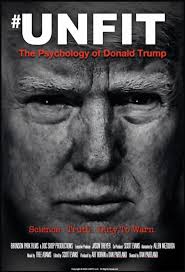
UNFIT: THE PSYCHOLOGY OF DONALD TRUMP
US, 2020, 83 minutes, Colour.
Directed by Dan Partland.
The Internet Movie Database has an accurately succinct summary: An eye-opening and shattering analysis of the behavior, psyche, condition, and stability of Donald Trump.
This documentary was released in 2020 during the presidential election year, the end of the Trump presidency and the election of the Democrats under the leadership of Joe Biden. And, of course, there was the uprising on January 6 and subsequent trials as well as the series of charges raised against Donald Trump after his being impeached twice. And his claim that the election was rigged against him.
The documentary, with material from the four years of the Trump administration, makes a case against Trump and his fitness for office.
There is quite a range of experts begin with George Conway. Conway was previously married to Trump’s Press Officer, Kellyanne Conway – and this film opening with her commentary about the truth or falsity of the numbers at the inauguration and her statement about alternative facts. George Conway, originally from the Philippines, a supporter of Trump, indicates the steps in his disillusionment. His comments recur throughout the film and are quite telling.
The range of experts includes John Gartner, Malcolm Nance and a range of experts (whose qualifications are listed before they speak) on psychology, on communication, a commentary on narcissism, the behaviour of a sociopath. There are black and white news footage sequences highlighting the career of Mussolini as well as Hitler, and parallels with Italy and Germany in the 1920s and 30s and the United States in the 21st-century. There is also a sequence showing the work of Jane Goodall with the chimpanzees in Africa, the behaviour in a group, the growth of the group, splitting into two, assertions of leadership.
Some anti—Trump commentators complain that the film, at 83 minutes, could have had greater depth. However, most audiences critical of Trump, fearful of Trump, the quickly persuaded of the truth of the opinion stated and appreciate the continued insights. (Clearly, there are comments from pro-Trump supporters who dismiss all the opinions, one commentator relishing the film and seeing liberals wallowing in their misery!).
With 2024, the election year, Trump re-nominating, Joe Biden withdrawing, Karmilla Harris emerging as the Democrat nominee, the film is certainly relevant.
However, the director, Don Partland, released two documentaries in 2024. There was God and Country (Looks at the implications of Christian Nationalism and how it distorts not only the constitutional republic, but Christianity itself.) And a second documentary about Trump, featuring George Conway again, John Gartner as an anchor personality, Malcolm Nance and others as well as fresh commentators: #UNTRUTH: The Psychology of Trumpism. Whilst reinforcing the statements about Trump, it looks at the psychology of divided America. And the IMDb description: Mental health experts analyze disinformation, false narratives, and untruths in American media and culture. It examines how profit-driven enablers and power-seeking politicians create divisions threatening democracy.
These descriptions of narcissism might be helpful in the diagnosis: True narcissism is a far deeper, darker issue.
Narcissistic personality disorder (NPD) is estimated to affect around 1% of the population, and is characterised by a grandiose sense of self-importance, a lack of empathy, an intense need for admiration, a deep envy of others, the belief they’reunique and deserving of special treatment, and a preoccupation with brilliance and unlimited power.
While many of us display some of these traits from time to time, it’s considered pathological when it’s a pattern of behaviours which impair a person’s daily functioning – with others often caught in the crossfire.
Note: Don Partland’s 2023 film, God + Country, is a further development of the theme, includes Donald Trump but focuses on the transition of many American Evangelical Christians being transformed into Christian Nationalists, culminating in religious motivation in the January 6th attack on the Capitol, 2021.
His 2024 documentary, #UNTRUTH: The Psychology of Trumpism completes the trilogy.
Thelma
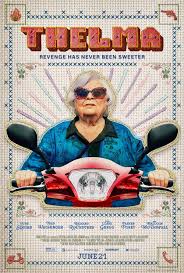
THELMA
US, 2024, 98 minutes, Colour.
June Squibb, Fred Hechinger, Richard Roundtree, Parker Posey, Clark Gregg, Malcolm McDowell.
Directed by Joshua Marston.
Lyricist Johnny Mercer once wrote “you’re either too young or too old…”. Here is a tale about a 94 year-old, a lot of it tongue-in-cheek, a lot of it quite hopeful, the proof that she is not too old.
She is a grandmother, Thelma, played by 94-year-old actress, June Squibb, a veteran character actress here getting a starring role. Her loving husband has died, she is living alone, but happily reliant at times on her grandson, Daniel (Fred Hechinger), genial, hert confidante, helping her when she is busy on her computer. They watch television and Thelma has a soft spot for Tom Cruise doing his own stunts in the Mission Impossible films.
Daniel is 24, thinks that he is not good at anything much, has a fussy overprotective mother, Parker Posey, and a demanding father (Clark Gregg) who is rigid in his interpretation of obligations.
However, the core of the story is one that will resonate with older audiences (and younger audiences who have been victims), the scam. Thelma receives a phone call, a voice impersonating Daniel, a plea for ransom money, her going to the bank, withdrawing it, posting it – and then the realisation of the scam.
Thelma is both humiliated and annoyed, and decides to take the matter in hand, relying on an old friend, Ben (Richard Roundtree, merely 80, Shaft himself over 50 years earlier, his last feature film). They form a very genial screen couple, June Squibb doing her own stunts – though they are mainly on a scooter with Ben, racing through the streets of LA. She also borrows a gun from another elderly housebound friend!
The enjoyment of the film is watching June Squibb, the actress enjoying herself in this role, entering into it wholeheartedly. Daniel is a sympathetic character and we like Ben. Not so much the fusy parents, very irritating!
And there is a cameo from Malcolm McDowell (only 82) as the villain.
What might be called an enjoyable action romp and an affirmation of grey power!
- Thelma, June Squibb, aged 94, her screen presence and performance?
- Themes of age and ageing, transcending age limits? Her fondness of looking at Tom Cruise and his stunts, Mission Impossible?
- Alma, her story, background of her long marriage, sadness at the death of her husband, living alone, managing, her daily routines? Her bond with her grandson, his care for her, conversations, driving? Her daughter fussing, stripped, her son-in-law and his ideas and mouthing them?
- The importance of Thelma working on the computer, older audiences identifying with her, the help from Daniel? The later use of the skills?
- The phone call, the impersonation of her grandson, the ransom, the phone connection, the directions, going to the bank, withdrawing the money, posting it? Her later finding the address?
- The situation and her determination, the strategy, going to the aged care home, visiting Ben, the bonds in the past, their mutual friends, regrets at deaths? The production of Annie and his role? Is Scooter, Thelma, it, the chase through the hospital, out into the streets, his decision, to get back for the performance, riding through the city, his exasperation is, their getting lost, separation, her falling, his coming to help her up (and his story about learning how to lift patients)? They’re persevering, finding the address?
- Visiting miner, living alone, old-age, memories, and Thelma getting the gun?
- Daniel, his age, self-image, not capable of doing things, the bond with his grandmother? His parents, the fuzziness, comments, protectiveness?
- The issue of film are being lost, her alarm and her removal? The family coming to the aged care Centre, the two interrogating the family, sympathy, comic touches? The Detective and the interviews? The family staying, anxious?
- Thelma and the service station, the photo, turning up on Daniel’s phone, tracking her down, the pursuit, his driving (without the licence despite his father), arriving, Thelma throwing the alarm over the fence, getting away?
- At the post office, following Michael, the shop, the owner, the antiques, the setup for the scam? The confrontation, denials, Thelma being funded, pulling the gun, the hearing aid contact with Ben, Michael escaping, bend tripping him? The confrontation with the owner, the computer, Thelma drawing on her skills, contact with Daniel, the transfer and success?
- Reconciliation with the family, affirmation of Daniel, arriving back for the performance of any? The bond with Ben?
Golden Delicious
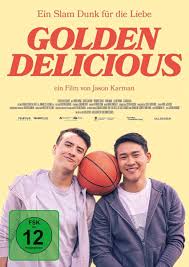
GOLDEN DELICIOUS
Canada, 2022, 120 minutes, Colour.
Cardi Wong, Chris Carson, Permiss Sehat, Ryan Mah, Leeeah Wong, Zavien Garrett, Jesse Hyde, Hunter Dillon.
Directed by Jason Karman.
Golden Delicious is, in fact, the name of a restaurant. In the setting is the Chinese community in Canada, their being part of the broad Canadian community, their special traditions, adaptation to the American continent and way of life.
At the centre of the story is a 17-year-old son of the restaurant owners, Jake (convincingly genial performance from Hardy Wong). He is a keen photographer. He has a girlfriend who is avidly devoted to him. His father, a basketball player but injured and withdrawing, dominates his son for practice. His mother is weary at the restaurant. His sister wants to continue developing cooking of Chinese food, something her mother is against.
At school, Jake has some friends, they play basketball together, and dominated by the captain.
The screenplay indicates to the audience that this is a coming-of-age film, that it is a film where the young man will become more aware of his sexual orientation, experiences difficulties and homophobia, come to terms with it and live acceptably in society, with his family and friends.
The focus of this growing awareness is the arrival of the next-door neighbour, Alex (Chris Carson) openly gay, skilful at basketball, the growing friendship between Jake and Alex. Not without self awareness, the impact for the girlfriend, for the school friends, attacks by the homophobic captain, the parents and sister coming to terms with the revelation when it is cruelly exposed on social media.
However, most of the atmosphere of the film is very genial with a happy ending – and a rather gentle comeuppance for the homophobic, simply showing him at the dance approaching the girls and their deciding to walk away from him, leaving Jake and Alex happily together.
A film which will resonate with young men discovering in coming to terms with their sexual orientation and a film which might be very helpful for parents.
- The title, the name of the restaurant, the tone?
- A Canadian film, the Chinese-Canadian community? In the context of the wide Canadian community, English-speaking, education, sport, relationships?
- The city setting, homes, school, streets, the restaurant, realistic atmosphere? The musical score?
- Jake’s story, his age, teenage, his place in the family, relationship with Janet and their discussions, rivalries? His relationship with his parents, his mother support, his dominating father, the basketball practice, insisting, causing the injury, the father’s injury and his limp? At school, dithering about university applications? His camera, love of photography? The relationship with Valerie, her devotion to him, over the years, his hesitations with her, her insistence, the sexual encounter and the aftermath? His noticing Aleks next door, the attraction, basketball dribbling? Photographing him?
- The background of the family, the narration about the pregnancy, the young marriage, inheriting the restaurant, scenes of the restaurant, the demands, Andrea and her being weary, bickering with George? Their arriving’s home separately? Her criticism of Janet’s cooking, not wanting her to continue with the Chinese style, inherited from the grandmother whose picture is on the wall, but Janet following her dream, cooking the meal, sharing with Jake, her mother tasting it but refusing? The increasing clash, the separation?
- Aleks, moving with his family, going to school, basketball skills, openly gay? Befriending Jake, defending him? The group playing basketball, Ronald and his sneers, at the game, in the corridors, the fights? His homophobia and aggression? The fight and breaking Jake’s camera?
- Jake, how aware of his orientation, his genuine friendship with Valerie, but his hesitations, Valerie as a character, love, determination?
- Jake and Aleks watching the television, Jake and the kissing, Aleks and the stripping, interrupted by the parents? The aftermath? Jake going with Valerie to the party, Aleks and his approach, going upstairs, the sexual encounter, Valerie discovery, going downstairs, everybody with their camera, the exposure?
- The consequences for Jake? Going by himself? Social media? Janet and her discovery, his parents? The family coming together, seeking out Jake, supportive of him?
- The reconciliation with Aleks? The preparation for going to the dance? Dressing in the suit, the rainbow tie? The support of his parents?
- At the dance, their being together, the continued support of Gary and Sam, the relationship, dancing together?
- Ronald, the quiet treatment of his comeuppance, approaching Valerie, the girls walking away from him, his being alone?
- Jake, true to himself, acknowledging his orientation, the relationship with Aleks, his future?
Touch/ 2023

TOUCH
Iceland/UK, 2024, 120 minutes, Colour.
Egill Olafsson, Koki, Palmi Kormakur, Masahiro Motoki, Yoko Narahashi, Ruth Sheen.
Directed by Baltasar Kormakur
This is a very moving drama from Iceland. The central character is ageing, health deteriorating, a doctor advising him to come to terms with any problem that has been gripping him over the years. He is Kristofer, widower with a daughter, but long memories.
As might be expected, there are two time eras in this film, the present with the ageing Kristofer, and many flashbacks which build up a strong and vivid picture of himself when young, his early life, and encounters which changed his life but which came to an abrupt and mysterious and.
In fact, the principal flashbacks are to London in the 1970s, Kristofer student of economics there, joining in protests of the time, but giving up on the studies and taking up a job in a Japanese restaurant in central London. He feels at home there. He learns some of the language. He learnd some of the ways of cooking. The owner, a refugee in the 1950s from Japan to London, a native of Hiroshima and the atomic bomb, the aftermath, with his young daughter, highly competent, initially wary of Kristofer.
But, we see the buildup of the relationship, Kristofer finding a zest in life, and in love with the daughter, Miko (played by Koki). And one day he goes to the restaurant and finds it closed, the family gone.
Again in the present, Kristofer goes back to London, finds the site of the restaurant, tracks down one of the workers there at the time, gets some information and, despite protests from his daughter, decides to go to Japan to discover the truth, to bring some calm to the anguish that he has experienced for half a century.
And audiences will find the sequences in Japan, a visit to Hiroshima (and quite a telling impact in being reminded of what happened with the bomb and its effect on
those who lived in the city), and his search for Miko and whether he will find her or not, engaging..
Director,Baltasar Kormakur was a pioneer in the 2000a of strong Icelandic drama. By 2010, he was making action films, especially in the United States with an American cast. Now his return to serious drama – and audiences will be thankful for this.
- The tone of the title? Communication? Tenderness? The long absence of touch?
- The work of the director, stories from Iceland, his dramas, the period of his action dramas, this film as a culmination of his work?
- The contemporary Icelanders settings, the terrain, the seasons, homes, towns, airport, leaving Iceland? The London settings, the 2020s, the site of the restaurant, the changes, the meetings? The London settings of the 1970s, students, protests, accommodation, jobs, the restaurant, the Japanese atmosphere, the streets and atmosphere London at the time?
- The Japanese locations, Tokyo, Hiroshima, the countryside? Modern, the buildings, parks, streets, high-rise? The flashbacks to Hiroshima in the past?
- Kristofer and his story, his age, the doctor, the diagnoses, physical condition, deteriorating mental condition, the advice to resolve any worries or concerns? His daughter and the phone calls, her concern? His disregard of them? The audience gradually building up the picture of the 50 years of the past, returning to Iceland, his work, marriage, the daughter?
- His decision to go to London, the airport, arrival, London changed, accommodation, seeking out the restaurant, its change, the proprietor? Tracking down the worker from the past, aged care, her giving him the information?
- The portrait of Kristofer in London, age, weary, anxious, searching? The decision to go to Japan?
- The insertion of the various flashbacks, Kristofer young, the background in Iceland, work, fishing, student in England, economics, fellow students, their bonding, camaraderie, the protests, the putting down of the protests? His ideology, giving up the studies, looking for a job?
- The Japanese restaurant, the proprietor, his asking for the job, his glimpse of Miko, his reaction, her reaction – the later revelation that she advised her father not to employ him? His discussion with his friends, their disbelief? His return, the owner hiring him, the conversations, the other workers, the woman and her background, the Opera singer, the atmosphere, the customers?
- Kristofer, taking to cooking, learning Japanese, the communication, Mico and the discussions with her, the bonding? Falling in love, the meetings, secrecy, in the flat, Mrs Ellis and her reactions and advice?
- The family background, quiet, Hiroshima, the decision to leave, no communication with Kristofer, the disappearance? The impact on him? 50 years?
- In Japan, getting the address for Miko, meeting the lady from the apartment, her arranging the contact, Miko and Kristofer reuniting, the years that had passed, Miko and her age, health, her life, her regrets of losing Kristofer?
- The bonding, the past years, sadness, joy in finding each other?
Untamed Royals/ Principes Selvajes
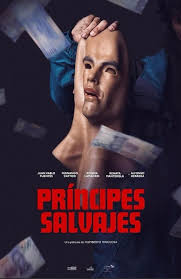
UNTAMED ROYALS/ PRINCIPES SALVAJES
Mexico, 2024, 95 minutes, Colour.
Juan Pablo Fuentes Acevedo, Fernando Cattori, Ximena Lamadrid, Alfonso Herrera, Renata Manterola.
Directed by Humberto Hinojosa Ozcariz.
A provocative title, provocative story.
Contemporary Mexico, life with the wealthy upper classes, the status of servants and working classes. But, the particular focus, is on the young adult children of the wealthy families, their being spoilt, their lack of moral sense, narcissistic behaviour, sociopathic behaviour, lack of scruple in their concern about themselves and despising others, scapegoating them for their own crimes.
The focus here is on two young men, one from a wealthy family, the other living with his incapacitated mother, not wealthy. They have built up a long time friendship, and something of a codependence. Xavier lives with his parents and his sister. Later he will admit that he knows there is something wrong with him, sometimes withdrawn, sometimes exuberant, especially in company with Gerardo. And there is a sexual connection with a neighbour, Renata, herself wealthy, spoilt, horse riding, using Tik-Tok…
There is also the picture of the servants in the two households, the chauffeur, his being dismissed for stealing a watch (which the daughter of the house had actually done). When there is a robbery at Xavier’s household, it is the chauffeur who is blamed, his house ransacked, his being tortured and then shot by the police, and the maids under suspicion.
The wealthy family has the police at its disposal and, initially they seemed to investigate the case, they are revealed to be corrupt and brutal.
The robbery in Xavier’s house is perpetrated by Gerardo, masked, and the two young men pantomiming an attack, intimidating the maid. Gerard’s motivation is to give money to his unscrupulous girlfriend and paying off criminal connections.
The second main crime that the two young men perpetrate is to pretend that they have held Renata for ransom, phone calls to her doctor mother, pressurising her by continued phone calls, to get the money from the bank, to deposit in public, the collecting it.
The audience thinks that the police are moving into arrest Gerardo but then show their true colours.
Which means that all the characters in the film are unpleasant, unlikable, so a sour kind of experience for the audience having to admit that these characters do exist and behave like this in real life.
Crow, The/ 2024
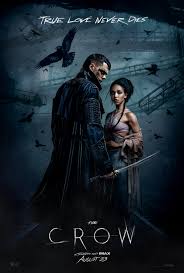
THE CROW
US, 2024, 111 minutes, Colour.
Bill Skarsgaard, FKA twigs, Danny Huston, Joette Simon, Laura Birn, Sami Bouajila, Jordan Bolger.
Directed by Rupert Sanders.
The Crow is based on comic novels by James O’ Barr. The first film, in 1993, made quite an impact in the era before the success of the Marvel Universe and its glamorous superheroes. Eric Draven, guided by a Crow, is a very dark comic book hero. (And the film had some notoriety because of the accidental death of its star, Brandon Lee, during production). 1996 to 2005 there were three sequels, much less successful than the original. There was also a television series.
The present film has been in production discussion since 2008. It was finally directed by Rupert Sanders (Snow White and the Huntsman, Ghost in the Shell). And, for the new incarnation of Eric, Bill Skarsgaard (sinister as Pennywise in the two It films, villain in John Wick 4). All was set for a revival of the franchise – but this film was not well received.
For audiences who have been following the franchise with enthusiasm, they will probably be in favour of this version. However, for the ordinary audience, there will be need to express a word of caution. In an official synopsis of the plot, the word to describe many of the deaths throughout The Crow is “savage”. As we watch so many of the killings of Eric’s enemies, swords and knives, guns and physical attacks, “savage” seems something of an understatement. They are particularly graphic, some visually brutal, alarming, and many audiences they will feel they want to turn away.
With this caution, it can be said that James O’ Barr as created quite an intriguingly dark mythology, a young addict in rehabilitation (where all the inmates where pink tracksuits! A bit of colour in the dark film) meets a young woman on the run from psychotic criminals who finds it safer to be in jail. They bond. They escape. They fall in love. They are tracked down – and murdered.
And here is the intriguing aspect. Eric comes to life again, in a strange purgatorial railyard, encounters Kronos, who enables him to go through experiences of death, violent assault deaths, but self-heal, not die. He has the task to rescue his fiancee from hell. He is commissioned to wreak revenge on the sinister villain, played in gentlemanly but slice style by Danny Huston, a man who has sold his soul to the devil long since, surviving by killing people, whispering in their ear to control them to self-destruction.
A revenge quest, a challenge to audience sympathies about Eric (with Bill Skarsgaard looking particularly young, too young? Even though he is in his early 30s). The violent culmination takes place during an Opera, the violence being operatically violent.
While this film contributes to the legend of The Crow and an alternative hero to the glamorous superheroes, it reminds us that we live in a violent era.
- 21st-century version of the comic book character? The popularity of the books? The Brandon Lee film version and the accident? The sequels and the impact? The television series?
- The basic plot, Eric, his fiancee, death, not dying, the revenge pursuit of the criminals, the supernatural elements? A new interpretation?
- The opening, Eric with the horse, the barbed wire, wanting to save it, the injuries to his hand? These images recurring later? His growing up, drug addiction, arrested, imprisoned? Life in prison, everybody wearing pink tracksuits? The discipline, the training, the sessions?
- Shelley, friends with Zadie, the video, compromising, Roeg and his determination, Marion as his assistant? Capturing Zadie, whispering in her ear, her death? Shelley pursued, the police, safer in prison than out? In prison, the encounters with Eric, friendship, dependence, the escape, setting up house, falling in love? Safety? But Roeg pursuing, Eric having seen Marion and Sophia in the prison? The irony of Shelley being Sophia’s daughter?
- The pursuit, Roeg and the dangers, capturing the couple, their deaths?
- Eric, age, looking young, the tattoos, waking up, the encounter with Kronos in the railyard, explaining his situation, Shelley and her being lost forever, the possibility of redemption, Eric and never dying but experiencing the pain of death and injury, the guidance of the symbolic Crow, the mission of revenge?
- Eric, his new situation, the friendship with Chance, the thugs catching up killing Chance?
- Eric, the confrontations, the deaths, his not dying, self-healing? The cumulative effect of the revenge theme, so many deaths, the brutality, the variations of weapons, numbers of death? The effect on Eric?
- Learning about the video, Shelley and the killing, losing faith in her, Kronos warning Eric?
- The interview with Sophia, Roeg and his promises, choosing her lifestyle over her daughter? Roeg whispering, her death?
- The buildup to the opera sequence, the performance of the Opera, the audience, Marion and her associate in the box, the phone calls to Roeg? The operatic nature of the revenge, Eric as an operatic figure, the succession of deaths intercut with the opera, Marion and her warning?
- The buildup to the confrontation with Roeg, his self-confidence, the back story of doing the deal with the devil, living on but killing people? Marion and her death? Her head? The final defeat of Roeg?
- And the possibility for future life and death experiences for Eric?